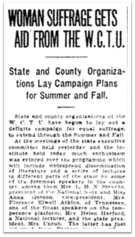By Matthew Norvell – Loyola University Chicago, Masters in Public History Program, Fall 2019.
The women’s suffrage movement and the temperance movement were two of the largest reform campaigns of the Progressive Era. Although at first glance these two political movements appear to have had little reason for crossover, they were in fact closely related. To many women in the late nineteenth and early twentieth century, the issues of temperance and suffrage could not be separated from each other.

No organization represents the link between temperance and suffrage better than the Woman’s Christian Temperance Union (WCTU). By the latter part of the nineteenth century, the movement for the prohibition of alcohol was increasingly dominated by women. By virtue of its association with the home, many women viewed temperance as an opportunity to become politically involved [1]. The WCTU was founded in 1874 and, because of this prevailing attitude, quickly became the largest organization of women in the United States, boasting a membership of 150,000 by 1892 [3]. The organization ultimately played an important role in the women’s suffrage movement on both a national scale and in Illinois.

Although the WCTU began as an anti-alcohol organization, it did not take long for suffrage to become an important part of the organization’s platform. Frances Willard became president of the organization in 1878 and immediately sought to move beyond the narrow mission of temperance. Willard, a resident of Evanston, IL, brought a petition asking for the enfranchisement of women in alcohol-related referendums to the Illinois General Assembly in 1879, becoming one of the first women to ever address that body [5]. She advocated for the Home Protection Ballot, which would allow women to vote on the granting of local liquor licenses. Although these limited demands were rejected, the petition marked the first of many similar measures that would be brought to the Illinois Assembly over the next few decades.

Throughout most of the early days of the WCTU’s suffrage activities, suffrage was primarily seen as a means to an end. A prevailing view within many of the reform movements of the late nineteenth century was that women voters, once enfranchised, would act as a counterbalance to a wide variety of social ills [7]. In this vein, the WCTU saw suffrage largely as a strategy to get more anti-alcohol politicians into office. At the 1882 Illinois WCTU convention, the superintendent of legislative work, Frances Willard’s sister-in-law Mary Willard, stated that if a prohibition referendum were approved the WCTU would, “pack away our petitions for the ballot…and bend all our energies to the campaign for prohibition” [8]. She made it very clear that if prohibition and suffrage came into conflict, prohibition would take precedent. At this early stage, there was also still some disagreement within the WCTU about suffrage. At the 1882 National WCTU convention, there was an admission that suffrage was not a priority for many state organizations and reassurances that the national organization would, “urge nothing upon any state or individual, beyond a candid consideration of the subject of the franchise” [9].
Although this attitude dominated the early stages of WCTU suffrage activism, legislative defeats and frustration with the slow progress of temperance led to an increasing dedication to the women’s ballot among the members of the WCTU. After witnessing the WCTU’s 1883 suffrage and prohibition petitions be sneered at by members of the Illinois Assembly, the President of the Illinois WCTU, Mary Allen West, expressed disillusionment saying, “Iron entered my soul. I vowed never again to present a similar petition, till Illinois elects as her representatives, men who do not forget their mothers are women” [10]. For a number of WCTU women, this disillusionment seems to have turned into a new level of commitment to the ballot. At the 1887 Illinois WCTU convention, the Franchise Department gave its strongest statement to date saying, “Since women are expected to fight the battle of life, they have a right to all the weapons of warfare” [11]. By 1889, the President of the Illinois WCTU was saying that, “The old doctrine of Woman’s Rights has been made more palatable these later years” and that, “many who once rejected it…are now accepting it with no attempt to hide their joy.” [13].

By the turn of the twentieth century, the WCTU was firmly committed to the cause of women’s suffrage. However, the organization never lost sight of its original purpose, and suffrage, while now considered nearly equal in importance to temperance, was never the main aim of the WCTU [14]. Nevertheless, the WCTU constantly supported suffrage, often publicizing suffrage events in its widely read newspaper, The Union Signal [15]. In 1913, Illinois became the first state east of the Mississippi to give women the ballot. This victory was a major cause for celebration for the Illinois WCTU [16]. The WCTU continued to support the suffrage movement on local, state, and national levels until the adoption of the Nineteenth Amendment in 1920.
Notes
[1] Ruth Borden. Woman and Temperance. Philadelphia: Temple Univ. Press, 1981. p.3.
[2] Mary McWilliams. “A Duty or Right? The Illinois Woman’s Christian Temperance Union And The Drive For Woman Suffrage In Illinois, 1877–1913,” unpublished draft of virtual exhibit at Willard House, PDF format, circa 2013-14. p.72.
[3] Ruth Borden. Woman and Temperance. Philadelphia: Temple Univ. Press, 1981. p.4.
[4] McWilliams, p.29.
[5] McWilliams, p.29.
[6] McWilliams, p.30.
[7] Kraditor, Aileen. The Ideas of the Woman Suffrage Movement, 1890-1920. New York: W.W. Norton & Company, 1981. p.60-61.
[8] 1882 Illinois WCTU Convention Minutes. Willard House Archives, Evanston IL. p.41.
[9] 1882 National WCTU Convention Minutes. Willard House Archives, Evanston IL.
[10] 1883 Illinois WCTU Convention Minutes. Willard House Archives, Evanston IL. p.23.
[11] 1887 Illinois WCTU Convention Minutes. Willard House Archives, Evanston IL. p.144.
[12] McWilliams, p.64.
[13] McWilliams, p.53.
[14] 1900 National WCTU Convention Minutes. Willard House Archives, Evanston IL. p.336.
[15] McWilliams, p.64.
[16] 1913 Illinois WCTU Convention Minutes. Willard House Archives, Evanston IL. p.103.
